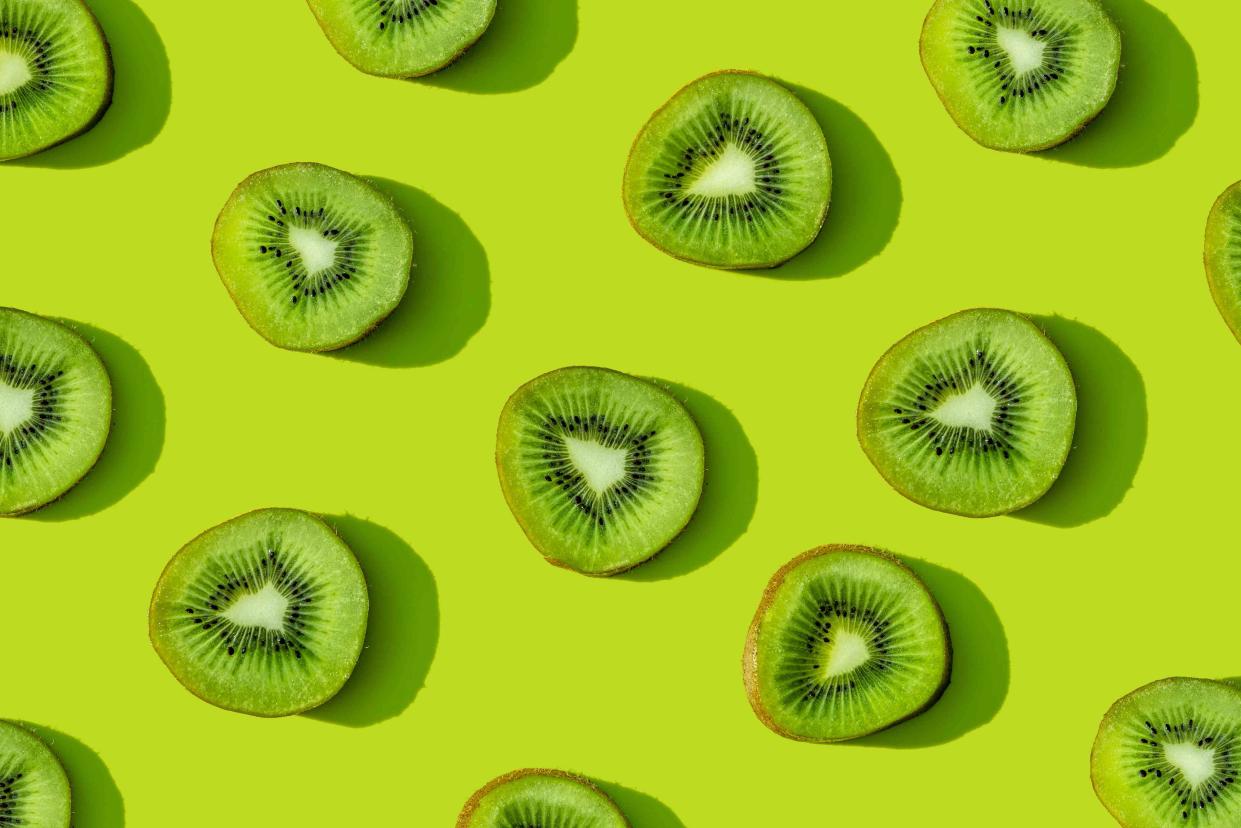Eating 2 Kiwis a Day Keeps Vitamin C Supplements Away

Westend 61 / Getty Images
Fact checked by Nick Blackmer
Key Takeaways
Two kiwis contain about 120 mg of vitamin C, enough to fulfill the daily recommended amount of vitamin C.
Research has suggested that eating two kiwis a day would replace the need for a vitamin C supplement.
Experts say that eating two kiwis a day can support immune health, and it's better to get vitamins from food over supplements in most cases.
Kiwis are an excellent source of vitamin C, an antioxidant that supports immune function, wound healing, and iron absorption.
Two green kiwis or one SunGold kiwi alone is enough to fulfill the daily vitamin C recommendations for most adults. It’s safe to eat kiwis every day, and these fruits could replace the need for vitamin C supplementation, according to a small study published in the journal Foods.
Natural sugars in the fruit aren’t high enough to increase long-term health risks, the researchers found.
“If people like the taste of kiwis or are curious about incorporating them into their diet, they shouldn’t hesitate to regularly eat them, unless they have an allergy,” said Emma Laing, PhD, RDN, director of dietetics at the University of Georgia, who was not involved in the study.
Vitamin C Recommendations
Men (ages 19+) need 90 mg of vitamin C per day, and women (ages 19+) need 75 mg. These recommendations increase for people who are pregnant, lactating, and those who smoke.
Eating Kiwis Is Probably Better Than Taking Vitamin C
Vitamin C supplements are marketed as immune boosters, but there isn’t a lot of evidence that shows people would benefit from taking vitamin C daily.
A 2016 review suggested that daily doses of 200 mg vitamin could reduce the “severity and duration of colds,” but that amount doesn’t have any effect on lowering the chances of catching a cold.
Even if you load up on vitamin C every day, your cells don’t retain this vitamin and absorption decreases once your tissues are saturated with it. Consuming more than 1,000 mg of vitamin C per day reduces the absorption rate to 50%.
“The kidneys work to excrete any excess vitamin C into the urine that the cells don’t use,” Laing said. “Consuming a daily supplement of vitamin C in excess of what your body requires does not have a health benefit, as anything extra will go unused and will literally be flushed down the toilet.”
Taking megadoses of vitamin C isn’t dangerous for most people. However, doses over 2,000 mg could cause gastrointestinal distress, diarrhea, or abdominal cramping.
The body absorbs vitamin C the same way whether it's from a supplement or a kiwi, but most nutrition experts recommend getting vitamins and minerals from food sources over dietary supplements.
Related: Why Eating Kiwi May Improve Your Well-being
The Health Benefits of Kiwis
Since kiwis contain nutrients beyond just vitamin C, eating these fruits also offers benefits that supplements alone can’t provide. A study published last year found that eating two kiwis a day can also help treat constipation, likely due to the fruit’s fiber content.
“Kiwis have ample amounts of vitamin C plus other healthful compounds that a single supplement can’t match, like other antioxidants, potassium, and fiber,” Laing said.
Making sure you’re reaching the daily recommended amount of vitamin C intake can also support immunity, especially during the winter months when viruses spread more easily, according to Dawn Earnesty, PhD, RDN, a registered dietitian and senior extension specialist at Michigan State University Extension.
A kiwi contains more vitamin C by weight than an orange. Two kiwis contain about 120 mg of vitamin C, which is higher than the daily recommended value. Eating kiwis could be a way to boost your vitamin C intake, but eating kiwis alone isn’t enough to prevent an illness.
“Exercise level, water intake, stress level, and other factors also impact our immunity,” Earnesty told Verywell in an email.
In addition to your diet, regular exercise and ample sleep are also crucial in enhancing your immune system and reducing inflammation.
Earnesty said that while kiwis can provide a “piece of the puzzle needed each day, but without the other pieces of the puzzle, your immunity still may not be 100%.”
Read Next: 6 Foods to Add to Meals to Help You Poop, According to Dietitians
What This Means For You
Kiwis are a great source of vitamin C and can be included in a varied diet to support the immune system.
Read the original article on Verywell Health.

